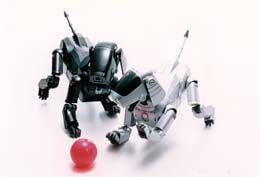|
 While
many Japanese people are choosing to own pet robots with artificial
intelligence, there are many others who doubt whether these high-tech
robots can ever serve as replacements for live pets. While
many Japanese people are choosing to own pet robots with artificial
intelligence, there are many others who doubt whether these high-tech
robots can ever serve as replacements for live pets.
When Sony marketed AIBO,
a doglike robot designed to interact with humans, in June this year,
people's reactions were mixed. Some hailed this cutting-edge invention,
saying, "It's as cute as a real dog." But some shied away, claiming
the robot was scary, precisely because it acts like a real dog.
One animal expert had words of warning
for fans of the robo-pet: "Keeping a pet robot is easy, since owners
don't have to deal with it when it's not convenient for them. And they
can throw it away when it breaks down or when they grow tired of it.
It's far better to keep a live pet, even if this involves a lot more
work. I'm worried that pet robots might encourage people to handle living
creatures with even less care than they do today."
A growing number of people are taking
a fresh look at the pet robot, however. Dozens of AIBO owners are sharing
their experiences on AIBO
Town, an Internet Website (Japanese only). The site operator believes
that most visitors are up on the latest computer technology and are
keeping AIBO as part of their "high-tech lifestyle."
AIBO owners contribute stories almost
daily to the Website, touching on such subjects like how much their
pet robot has "learned," how AIBO reacts to a real cat, and how AIBO
responds to strangers. Many apparently regard their "pets" with affection.
One nursing home director in Osaka
Prefecture has found that pet robots can have a positive effect on residents.
The home cooperated with a company developing a pet robot for elderly
people living alone, and the director notes that residents' reactions
were quite interesting.
"In the beginning, many were
skeptical, saying 'Oh, it's just kid stuff' and 'How can a machine touch
me emotionally.' But as they played with it, most of them enjoyed interacting
with it. Some people may dislike such robots, but in some ways they
have the same effect on people as real pets. It might help people open
up more to others," says the director.
The Kanagawa Prefectural Board of
Education, meanwhile, is planning to use pet robots to help promote
the psychological development of children who refuse to go to school.
Sony, encouraged by the popularity
of AIBO, marketed a new version in November. Just like the original,
the new AIBO has artificial intelligence that can replicate emotions
like joy, anger, and sadness, expressing them through actions like wagging
its tail.
The price is 250,000 yen, the same
as the earlier version, and 10,000 units were put on sale. Nearly 130,000
orders were placed in Japan alone, and the company conducted a drawing
to choose the buyers.
Photo: The AIBO is gaining attention as something more
than just a mechanical dog. (Sony
Corp)
|

